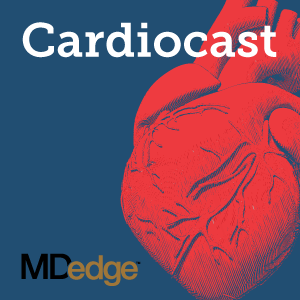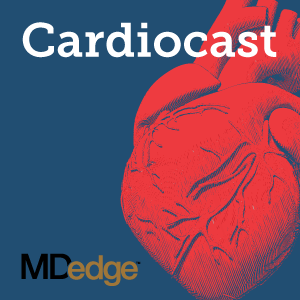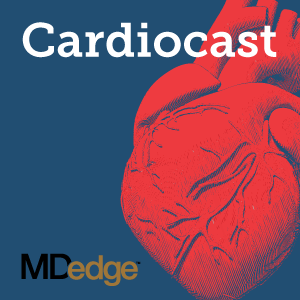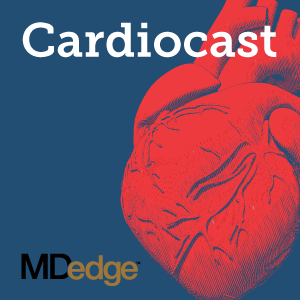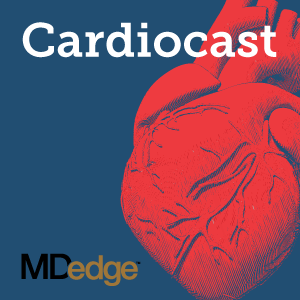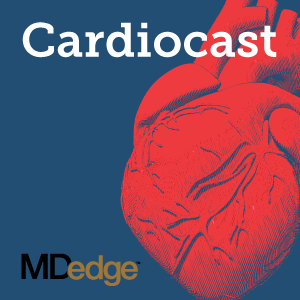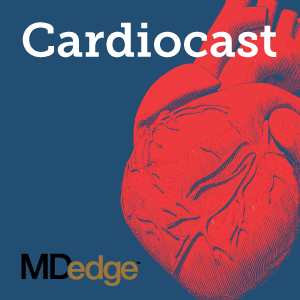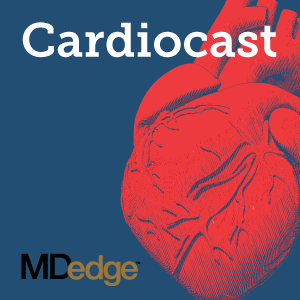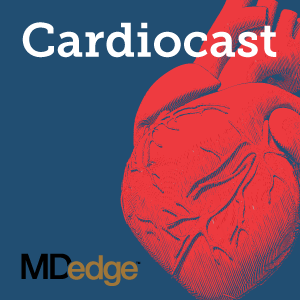User login
New LDL-lowering drug under FDA review
This week in MDedge Cardiocast: A novel drug lowers LDL in on top of maximums statins, invasive cardiology is a top money maker for hospitals, a meta-analysis parses the heart and kidney benefits of new diabetes drugs, and the AHA warns that heart-harming toxins may hurt hookah smokers.
Amazon Alexa
Apple Podcasts
Google Podcasts
TuneIn
This week in MDedge Cardiocast: A novel drug lowers LDL in on top of maximums statins, invasive cardiology is a top money maker for hospitals, a meta-analysis parses the heart and kidney benefits of new diabetes drugs, and the AHA warns that heart-harming toxins may hurt hookah smokers.
Amazon Alexa
Apple Podcasts
Google Podcasts
TuneIn
This week in MDedge Cardiocast: A novel drug lowers LDL in on top of maximums statins, invasive cardiology is a top money maker for hospitals, a meta-analysis parses the heart and kidney benefits of new diabetes drugs, and the AHA warns that heart-harming toxins may hurt hookah smokers.
Amazon Alexa
Apple Podcasts
Google Podcasts
TuneIn
Forget what you learned about infective endocarditis
This week in MDedge Cardiocast: Infective endocarditis isn’t what it used to be, there’s a new, lower goal for Americans’ dietary intake of sodium, a drug to treat multiple myeloma also raises heart failure risk, and Big Pharma says it can’t drop drug list prices alone.
Amazon Alexa
Apple Podcasts
Google Podcasts
TuneIn
This week in MDedge Cardiocast: Infective endocarditis isn’t what it used to be, there’s a new, lower goal for Americans’ dietary intake of sodium, a drug to treat multiple myeloma also raises heart failure risk, and Big Pharma says it can’t drop drug list prices alone.
Amazon Alexa
Apple Podcasts
Google Podcasts
TuneIn
This week in MDedge Cardiocast: Infective endocarditis isn’t what it used to be, there’s a new, lower goal for Americans’ dietary intake of sodium, a drug to treat multiple myeloma also raises heart failure risk, and Big Pharma says it can’t drop drug list prices alone.
Amazon Alexa
Apple Podcasts
Google Podcasts
TuneIn
AHA drills into CV risk factors in children
the FDA says a popular gout drug raises cardiovascular risk, an AHA statement targets CV risk factors in children, and a class action suit against the American Board of Internal Medicine over MOC gets financial support from doctors.
the FDA says a popular gout drug raises cardiovascular risk, an AHA statement targets CV risk factors in children, and a class action suit against the American Board of Internal Medicine over MOC gets financial support from doctors.
the FDA says a popular gout drug raises cardiovascular risk, an AHA statement targets CV risk factors in children, and a class action suit against the American Board of Internal Medicine over MOC gets financial support from doctors.
Who is least adherent to statins, and more
This week in MDedge Cardiocast: Silent strokes are pretty common after noncardiac surgery, troubling news about nonadherence to statins, what cardiologists need to know about ARVC, and how gender inequality in medicine affects the health of ALL women.
This week in MDedge Cardiocast: Silent strokes are pretty common after noncardiac surgery, troubling news about nonadherence to statins, what cardiologists need to know about ARVC, and how gender inequality in medicine affects the health of ALL women.
This week in MDedge Cardiocast: Silent strokes are pretty common after noncardiac surgery, troubling news about nonadherence to statins, what cardiologists need to know about ARVC, and how gender inequality in medicine affects the health of ALL women.
What comes first with SGLT2 inhibitors – diabetes or heart failure?
This week in MDedge Cardiocast: Most tPA-eligible stroke patients now get treated within an hour, atrial fib patients with prior hemorrhagic stroke who get their LAA closed can be safely treated, , and the MESA cardiovascular disease risk calculator can be an improvement on the ACC/AHA version.
This week in MDedge Cardiocast: Most tPA-eligible stroke patients now get treated within an hour, atrial fib patients with prior hemorrhagic stroke who get their LAA closed can be safely treated, , and the MESA cardiovascular disease risk calculator can be an improvement on the ACC/AHA version.
This week in MDedge Cardiocast: Most tPA-eligible stroke patients now get treated within an hour, atrial fib patients with prior hemorrhagic stroke who get their LAA closed can be safely treated, , and the MESA cardiovascular disease risk calculator can be an improvement on the ACC/AHA version.
‘Simple’ way to cut PAD risk, misguided ED visits for atrial fib, and more
This week in MDedge Cardiocast: Elevated CAC in highly active men doesn’t raise risk of death, Life’s Simple 7 scores can be used to modify PAD risk, medical guidance often leads atrial fibrillation patients to needlessly seek emergency department care, and thinking of pregnancy as a stress test can help predict women’s future cardiovascular risk.
Amazon AlexaApple Podcasts
Google Podcasts
TuneIn
This week in MDedge Cardiocast: Elevated CAC in highly active men doesn’t raise risk of death, Life’s Simple 7 scores can be used to modify PAD risk, medical guidance often leads atrial fibrillation patients to needlessly seek emergency department care, and thinking of pregnancy as a stress test can help predict women’s future cardiovascular risk.
Amazon AlexaApple Podcasts
Google Podcasts
TuneIn
This week in MDedge Cardiocast: Elevated CAC in highly active men doesn’t raise risk of death, Life’s Simple 7 scores can be used to modify PAD risk, medical guidance often leads atrial fibrillation patients to needlessly seek emergency department care, and thinking of pregnancy as a stress test can help predict women’s future cardiovascular risk.
Amazon AlexaApple Podcasts
Google Podcasts
TuneIn
Atrial fib guidelines updated, SPRINT MIND published, and more
This week in cardiology news, revised atrial fibrillation guidelines revamp anticoagulation, the SPRINT MIND results showing that tight BP control staves off mild cognitive impairment are published, the FDA discovers that nitrosamine-contaminated ARBs have been on the market for years, and subclinical hypothyroidism boosts the immediate risk of heart failure.
Amazon Alexa
Apple Podcasts
Google Podcasts
TuneIn
This week in cardiology news, revised atrial fibrillation guidelines revamp anticoagulation, the SPRINT MIND results showing that tight BP control staves off mild cognitive impairment are published, the FDA discovers that nitrosamine-contaminated ARBs have been on the market for years, and subclinical hypothyroidism boosts the immediate risk of heart failure.
Amazon Alexa
Apple Podcasts
Google Podcasts
TuneIn
This week in cardiology news, revised atrial fibrillation guidelines revamp anticoagulation, the SPRINT MIND results showing that tight BP control staves off mild cognitive impairment are published, the FDA discovers that nitrosamine-contaminated ARBs have been on the market for years, and subclinical hypothyroidism boosts the immediate risk of heart failure.
Amazon Alexa
Apple Podcasts
Google Podcasts
TuneIn
FDA: Benefits still outweigh risks from paclitaxel-coated devices for PAD
This week, the FDA weighs in on concerning reports about paclitaxel-coated stents, and it approves a device to treat patent ductus arteriosus in infants weighing as little as 2 pounds. Also, a treat-to-target approach for CVD risk factors decreased atherosclerosis in rheumatoid arthritis patients, and ezetimibe was effective for primary prevention in elderly patients.
Subscribe to Cardiocast wherever you get your podcasts.
Amazon Alexa
Apple Podcasts
This week, the FDA weighs in on concerning reports about paclitaxel-coated stents, and it approves a device to treat patent ductus arteriosus in infants weighing as little as 2 pounds. Also, a treat-to-target approach for CVD risk factors decreased atherosclerosis in rheumatoid arthritis patients, and ezetimibe was effective for primary prevention in elderly patients.
Subscribe to Cardiocast wherever you get your podcasts.
Amazon Alexa
Apple Podcasts
This week, the FDA weighs in on concerning reports about paclitaxel-coated stents, and it approves a device to treat patent ductus arteriosus in infants weighing as little as 2 pounds. Also, a treat-to-target approach for CVD risk factors decreased atherosclerosis in rheumatoid arthritis patients, and ezetimibe was effective for primary prevention in elderly patients.
Subscribe to Cardiocast wherever you get your podcasts.
Amazon Alexa
Apple Podcasts
Sleep: Too much, too little both tied to atherosclerosis
; dabigatran matches aspirin for second stroke prevention; HDL particle subfractions may be prognostic in heart failure; and a novel drug safely reduced LDL cholesterol in statin-intolerant patients.
Subscribe to Cardiocast wherever you get your podcasts.
Amazon Alexa
Apple Podcasts
; dabigatran matches aspirin for second stroke prevention; HDL particle subfractions may be prognostic in heart failure; and a novel drug safely reduced LDL cholesterol in statin-intolerant patients.
Subscribe to Cardiocast wherever you get your podcasts.
Amazon Alexa
Apple Podcasts
; dabigatran matches aspirin for second stroke prevention; HDL particle subfractions may be prognostic in heart failure; and a novel drug safely reduced LDL cholesterol in statin-intolerant patients.
Subscribe to Cardiocast wherever you get your podcasts.
Amazon Alexa
Apple Podcasts
Biodegradable stent polymer offers no long-term protection
This week from MDedge Cardiology, a biodegradable polymer shows no long-term benefit in heart stents, appropriate use criteria for imaging in nonvalvular heart disease are released, ACOG updates guidance on hypertension in pregnancy, and more losartan lots are recalled.
Subscribe to Cardiocast wherever you get your podcasts.
Amazon AlexaApple Podcasts
This week from MDedge Cardiology, a biodegradable polymer shows no long-term benefit in heart stents, appropriate use criteria for imaging in nonvalvular heart disease are released, ACOG updates guidance on hypertension in pregnancy, and more losartan lots are recalled.
Subscribe to Cardiocast wherever you get your podcasts.
Amazon AlexaApple Podcasts
This week from MDedge Cardiology, a biodegradable polymer shows no long-term benefit in heart stents, appropriate use criteria for imaging in nonvalvular heart disease are released, ACOG updates guidance on hypertension in pregnancy, and more losartan lots are recalled.
Subscribe to Cardiocast wherever you get your podcasts.
Amazon AlexaApple Podcasts
